Clifford Garstang's Blog, page 88
January 20, 2013
Virginia Festival of the Book, March 20-24, 2013
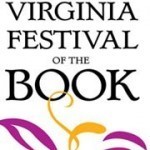 The Virginia Festival of the Book is just two months away. For booklovers in these parts, the festival can’t be beat and I always look forward to it. I’ll be a busy festival-goer this year, as I am on three panels and will be attending as many others as I can.
The Virginia Festival of the Book is just two months away. For booklovers in these parts, the festival can’t be beat and I always look forward to it. I’ll be a busy festival-goer this year, as I am on three panels and will be attending as many others as I can.
My first panel is on opening day, Wednesday, March 20, at 6:00pm, at The Bridge PAI: The Big Read Presents The Ties That Bind–Family in Fiction. Five authors will discuss the role of family in their fiction and also will discuss Amy Tan’s The Joy Luck Club, the Charlottesville area selection for The Big Read. (The five authors are Mollie Cox Bryan, Lydia Netzer, Camisha Jones, Wendy Shang, and me.)
On Thursday the 21st, I’m on a panel at Barnes & Nobel at 2:00pm: The Art and Craft of Short Stories. The Festival always includes one or two short fiction panels. This one features Robert Day, E.J. Levy, Kurt Rheinheimer, and me.
And then on Friday the 22nd at 10:00am I get to moderate a panel at the UVa Bookstore: Fiction: Forbidden Attractions. The panel features Margaret Wrinkle, Maryanne O’Hara, Bill Roorbach, and Erika Robuck. I enjoy moderating these panels and try to get the books read ahead of time so I can ask the authors embarrassing probing questions.
Three chances to see me! And of course there are lots of other writers you’ll want to hear, too, like Jill McCorkle, Chris Tilghman, Susan Shreve, Sheri Reynolds, C.J. Box, Rita Mae Brown, Ed Falco, Andy Straka, Sarah Kennedy, Laura Brodie, Alma Katsu, and so many more! I hope to see you there.
January 19, 2013
2013 Reading: The Hours by Michael Cunningham
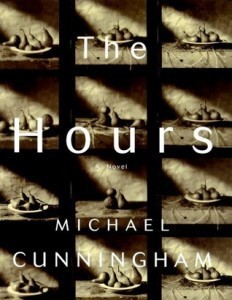 I’ve had The Hours by Michael Cunningham on my shelf for a long time—I have it in hardcover, if that’s an indication—and it was published in 1998. (My copy has a “Winner of the Pulitzer Prize” gold sticker attached.) So I should have read it before now. No excuses, other than that there are lots of other books out there that also deserve to be read.
I’ve had The Hours by Michael Cunningham on my shelf for a long time—I have it in hardcover, if that’s an indication—and it was published in 1998. (My copy has a “Winner of the Pulitzer Prize” gold sticker attached.) So I should have read it before now. No excuses, other than that there are lots of other books out there that also deserve to be read.
But I pulled it out last year to move it into my TBR queue because I started working on a novel that takes place in multiple periods, decades apart. When I attended a program at last year’s Virginia Festival of the Book one of the authors mentioned that her novel (Pamela Redmond, The Possibility of You) was timed in a similar way and part of her writing preparation was to read and analyze how Cunningham had done it in The Hours. So I figured I should at least read the thing, to see if it would help.
I don’t know that it really will help me much, but I enjoyed the read anyway. Everyone has probably read the book already, but it’s set in three different periods. One features Virginia Woolf in the 1920s in the suburbs of London as she’s in the process of writing Mrs. Dalloway, and struggling with her own fragile mental health. Then there’s the thread set in New York in the late 1990s which features a woman, Clarissa (known by her dying friend, Richard, as “Mrs. Dalloway” because the character’s name was also Clarissa), who is in a committed relationship with another woman, Sally, but who in her youth was in love with Richard. And in between those stories we have Mrs. Brown’s story, set in Los Angeles in 1949, as she is facing a second pregnancy and is somewhat ambivalent about her young son, Richie (who, it turns out, is the Richard of the 1990s story). She’s contemplating suicide.
It’s fairly depressing, since we know Woolf’s fate—suicide in 1941. Mrs. Brown is thinking of suicide herself and is reading Woolf. In the 90s, Clarissa seems fine, but Richard, dying of AIDS, is in a bad way. Near the end of the book, he says: “I don’t know if I can face this. You know. The party and the ceremony, and then the hour after that, and the hour after that.” Clarissa tells him he doesn’t have to go to the party or the ceremony. And he says: “But there are still the hours, aren’t there? One and then another, and you get through that one and then, my god, there’s another. I’m so sick.”
Terrific book, whether or not it will help me write mine.
Guest Post: Terri Kirby Erickson
Poetry: The People’s Choice
by Terri Kirby Erickson
At the recent 2013 People’s Choice Awards, the lovely host Kaley Cuoco made poets’ lives a little tougher when it comes to engaging people’s interest in our work. She threatened to read and/or recite poetry to the audience (and to the millions of viewers watching her on television) instead of introducing the next pair of celebrity presenters—in a tone that suggested doing so would be tantamount to shouting, “Fire!” in a crowded room.
Obviously no one took her seriously since the audience laughed and remained seated. I couldn’t help but sigh, however, because a beloved public figure that has perhaps never been moved or engaged by a fine poem chose to poke fun at an art form she may know little or nothing about. Or at least, the writers who gave her that line chose that route. And heaven knows a lot of folks, particularly young people, do their best to emulate celebrities. Their opinions and even intimations of opinions are taken very seriously.
As the author of three collections of poetry that I (alongside my publisher, Press 53) have done my level best to market (and have succeeded very well “for books of poetry,” which is rather like saying “you look good for your age…”), I have to admit that poetry can be a tough sell. The word itself seems to inspire the kind of dread students feel in their high school English courses when the teacher calls on them to explain “the meaning” of a poem to the rest of the class. So comments like Ms. Cuoco’s that seem to disparage poetry, are definitely not helpful.
I understand that we live in an age where people are constantly over-stimulated by loud and raucous television shows, movies with a million special effects, violent video games, computers, interactive phones, and other “in-your-face” forms of entertainment. So plopping down in a quiet corner to read a book of poetry seems about as appealing to some people as watching an inch worm climb a tree, or worse. But I’m here to tell you, those who take a chance on liking it, quite often do.
There are all sorts of poets in the world and billions of poems, each of them as individual as the writers. Surely among so many, every person who claims that he or she doesn’t “like poetry,” can find one poem that moves him or her. And if there is one, there are probably two. And pretty soon you’ll find a whole host of poems and poets that appeal to you—poems that stick in your mind and often give voice to thoughts and feelings that every reader has had and possibly cannot articulate.
I have seen with my own eyes the healing power of poetry when it comes to physical illness, emotional suffering, and feeling disconnected from other human beings for various reasons, including the simple fact of being a teenager. It is wonderful to watch young people’s faces light up when they read a poem and “see” themselves or someone they love in it—how that sense of connection makes them feel less alone than they may have felt only a moment before. And poems can make us laugh, too, which is always good medicine.
Most of all, reading a poem which is by nature short and pithy in comparison to prose, requires the reader to fill in a lot of narrative blanks or in other words, use one’s imagination. And having a good imagination is the first step toward learning compassion and empathy because we must be able to “imagine” what someone else is going through in order to feel something about it and respond appropriately.
There are many arguments I could make about the value of reading poetry, and listening to others read it aloud can be an enriching experience, as well. I will admit (naming no names, of course) that I have occasionally been bored into a coma by poets who ramble on too long, or who spend half their time at the podium trying to decide what to read. I’m sure I’ve been guilty of boring people a time or two, as well. But if you’ll pick up a book of poetry and read it, or listen for that one line that heads like an arrow, straight for your heart, I promise you won’t regret it.
And as for Kaley Cuoco (or future hosts) along with the cast of writers for The People’s Choice Awards—maybe next year you could think about adding a poem to the broadcast. In fact, I’ll be glad to send you a few poems and even read one to the audience, myself. I’m almost sure I have an evening gown and high heels in my closet, hiding somewhere behind my sweater sets and multiple pairs of sensible shoes!
Terri Kirby Erickson is author of three collections of poetry, including In the Palms of  Angels (Press 53), winner of a Nautilus Silver Award for Poetry and a Gold Medal for Poetry in the Next Generation Indie Book Awards. Her work has been published in former U.S. Poet Laureate Ted Kooser’s American Life in Poetry, 2013 Poet’s Market, JAMA, The Christian Science Monitor, North Carolina Literary Review, Boston Literary Magazine, Verse Daily, and many others. She has won numerous awards for her poetry, and is the 2013 Leidig Keynote Poet for
Emory & Henry
College
. Visit her website at http://terrikirbyerickson.wordpress.com
Angels (Press 53), winner of a Nautilus Silver Award for Poetry and a Gold Medal for Poetry in the Next Generation Indie Book Awards. Her work has been published in former U.S. Poet Laureate Ted Kooser’s American Life in Poetry, 2013 Poet’s Market, JAMA, The Christian Science Monitor, North Carolina Literary Review, Boston Literary Magazine, Verse Daily, and many others. She has won numerous awards for her poetry, and is the 2013 Leidig Keynote Poet for
Emory & Henry
College
. Visit her website at http://terrikirbyerickson.wordpress.com
January 17, 2013
One Night Standing
I’ll be reading at the One Night Standing monthly program in Roanoke on Feb. 10. along with journalist Ralph Berrier. Hope you can join us that night!
January 14, 2013
The New Yorker: “Experience” by Tessa Hadley
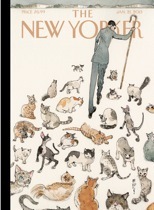 January 21, 2013: “Experience” by Tessa Hadley
January 21, 2013: “Experience” by Tessa Hadley
I didn’t want to like this story because I think the New Yorker publishes too many Hadley stories. (Or it just seems that way; there was only one in 2012 but four in 2011.) Usually they’re quite good, though, and, reluctantly, I have to admit that this one is, too.
Laura is splitting from her husband—his idea—and since she can’t afford the rent on their flat, he suggests that she leave. (Thoughtful, no?) She has no place to go, but she lucks into a house-sitting gig when Hana needs to go to the States for a few months. It sounds like a great house, Hana give her the run of the place, and it’s just what Laura needs. Laura, though, is a snoop (not that I blame her, honestly), and when she realizes that Hana has tucked a lot away in the locked attic, she looks for the key and pokes around. And she finds some interesting stuff, including sex toys and a racy diary of Hana’s affair with someone called Julian.
Who promptly shows up! His arrival is owing to some camping gear stowed in Hana’s house—in the attic. He retrieves the gear but then comes back, asking Laura if he can leave some other personal things in the attic because he’s leaving his wife. Laura, who hasn’t been doing anything and is running out of money, is turned on by Julian (and by her reading of what he and Hana had been doing), so she’s quite happy to have him back. He even cooks her dinner (she nearly faints from hunger after a glass of wine) and Laura is more than open to the idea of seduction. But then . . .
The story is not behind the paywall, so you can read it for yourself. I liked the ending because it seemed to be heading in a fairly trite direction, but then swerved. The characters here—at least Hana and Julian—are memorable. I don’t have nearly as clear a picture of Laura, except when she’s dressed in Hana’s clothes. All in all, Laura’s stay at Hana’s place is quite an “experience,” to echo the story’s title, and Laura discovers that she’s not quite as inexperienced as she thought she was. She’s able, with this discovery, to move from her ex-husband.
I liked it. Early front-runner for Story of the Year. (The link for the Q&A with Tessa Hadley wasn’t working when I posted this, so I shall return to update the post when it is.)
January 13, 2013
2013 Reading: Prosperous Friends by Christine Schutt
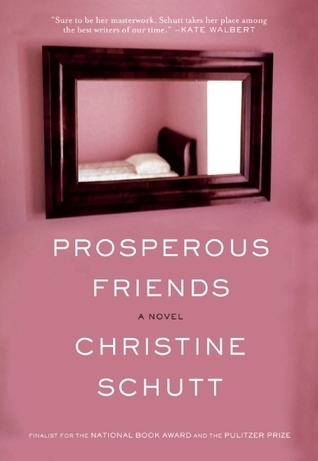 Prosperous Friends by Christine Schutt is probably not for everyone. But if you like lyrical sentences and complex characters, and don’t need to have a raucous plot, you’ll like this book very much. I did.
Prosperous Friends by Christine Schutt is probably not for everyone. But if you like lyrical sentences and complex characters, and don’t need to have a raucous plot, you’ll like this book very much. I did.
The writing is stunning, and the characters of Ned and Isabel are fascinating. And there IS a plot. It’s just not one that involves much mystery or action. Consider this book the antidote to Gone Girl, by Gillian Flynn. The enjoyment of that book was in its breathless pace and surprise (fueled, it has to be said, by deception), but the characters were flat and implausible. Here, the reader practically feels Ned and Isabel in the room with him.
Maybe because they’re writers? They meet at Columbia. They marry, too soon, probably, they go to London, travel on the Continent. They come back and they’re not very happy. He’s struggling to find his voice—he writes short stories and can’t get a collection published, imagine that—and she’s just floundering. And then there’s Phoebe, Ned’s ex-girlfriend. Isabel is jealous, sort of.
More fascinating characters: Clive and Dinah. Clive is a somewhat famous painter (and uncle of Phoebe’s husband Ben). Dinah is his current wife. Sally is Clive’s depressed daughter. I would gladly have read more about them all.
And sex? Schutt’s writing style is elliptical, and so much of what happens is missing, but is there just the same. Beautiful stuff.
Here’s a review of the book by Ron Charles in the Washington Post.
By way of disclaimer (and bragging), I should say that Christine Schutt was kind enough to blurb my book (which you can read more about here).

January 11, 2013
2013 Reading: Home by Toni Morrison
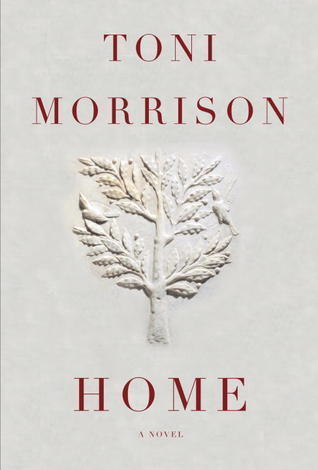 Home by Toni Morrison is a real disappointment. I read A Mercy when it came out a couple of years ago and thought it was fantastic, on par with Morrison’s masterpiece, Beloved. While Home has some powerful moments and extremely important subject matter, the language is indifferent and overall the story isn’t fresh.
Home by Toni Morrison is a real disappointment. I read A Mercy when it came out a couple of years ago and thought it was fantastic, on par with Morrison’s masterpiece, Beloved. While Home has some powerful moments and extremely important subject matter, the language is indifferent and overall the story isn’t fresh.
Frank “Smart” Money has returned from the Korean War, but he’s a mess. We gradually learn that his two childhood friends Mike and Stuff died in the war, but his problems go beyond his mourning. He connects with a sweet woman, Lily, who is making her own way as a seamstress, but his problems are too much for him to take. He gets words that his sister Cee is dying and needs help, and so he heads home to Lotus, Georgia, running into his share of trouble along the way.
The one thing that makes the book stand out, and the only thing that could have saved it, is the reason for Cee’s illness. Desperate for a job, she works for a Doctor who uses her to conduct experiments. This is explosive stuff, but Morrison makes it seem like a minor aspect of the novel, which mostly centers on Frank and his problems.
It’s a very short book and fast read, though, so I’m still glad I read it.
January 10, 2013
2013 Reading: How to Predict the Weather by Aaron Burch
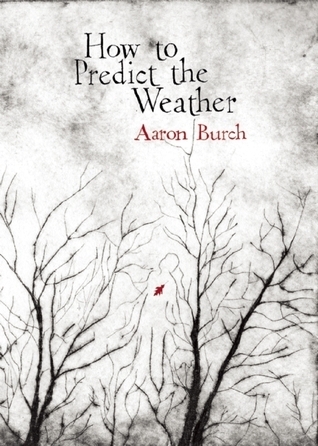 I confess that I picked up Aaron Burch’s How to Predict the Weather out of my to-be-read pile (one of many, in truth) because it was short. I know Aaron, and so I’d intended to read it eventually anyway, but brevity is what drew me to it last night. And I liked it a lot. The book is extremely hard to categorize. It reads a bit like a collection of poetry (at about 100 pages in a small format, it’s about the right length). But it’s all prose, and the individual pieces are of two types. There are the instructions, in italics. And then there is the narrative of the unnamed man and woman and the trials and tribulations of their relationship. Since these latter pieces have, more or less, an overall narrative arc, leavened by the italicized instructions, the effect is of one cohesive short work—a novella in flash, maybe. Cool cover, too. There’s a lot to like about this little book.
I confess that I picked up Aaron Burch’s How to Predict the Weather out of my to-be-read pile (one of many, in truth) because it was short. I know Aaron, and so I’d intended to read it eventually anyway, but brevity is what drew me to it last night. And I liked it a lot. The book is extremely hard to categorize. It reads a bit like a collection of poetry (at about 100 pages in a small format, it’s about the right length). But it’s all prose, and the individual pieces are of two types. There are the instructions, in italics. And then there is the narrative of the unnamed man and woman and the trials and tribulations of their relationship. Since these latter pieces have, more or less, an overall narrative arc, leavened by the italicized instructions, the effect is of one cohesive short work—a novella in flash, maybe. Cool cover, too. There’s a lot to like about this little book.
January 9, 2013
2013 Reading: Love’s Winning Plays by Inman Majors
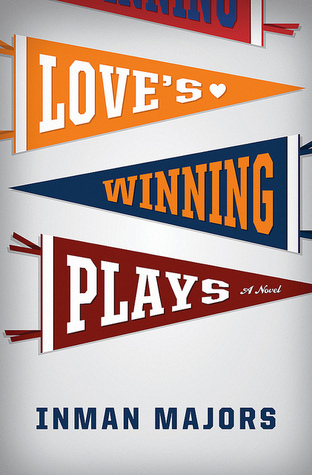 Love’s Winning Plays: A Novel by Inman Majors is a quick, fun read. It’s about Graduate Assistant Coach Raymond Love, a Division III quarterback who dreams of a career in college coaching. He’s at an unnamed SEC school in a precarious position, hoping to get a regular coaching gig. In the meantime, he’s exposed to the seamy underbelly of big time college athletics.
Love’s Winning Plays: A Novel by Inman Majors is a quick, fun read. It’s about Graduate Assistant Coach Raymond Love, a Division III quarterback who dreams of a career in college coaching. He’s at an unnamed SEC school in a precarious position, hoping to get a regular coaching gig. In the meantime, he’s exposed to the seamy underbelly of big time college athletics.
War and Peace it’s not—a good thing, maybe—but it’s a highly entertaining story about honesty, integrity, and loyalty. And there’s a little romance along the way, plus some jabs at sensational journalism, football boosters, sports fan chat-rooms, and ass-kissing underlings. And Athletic Directors. Athletic Directors don’t come off very well, either.
I enjoyed it, and it helped prolong the college football season one more day!
January 8, 2013
2013 Reading: Arcadia by Lauren Groff
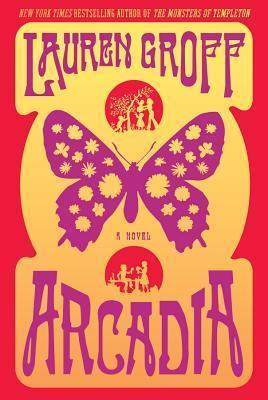 Arcadia by Lauren Groff is my first book of 2013. I enjoyed it very much, especially in the second half. The book is narrated by Bit, the child of Abe and Hannah, a couple of wonderful hippies who are founding residents of Arcadia, a sprawling commune in upstate New York. In the first half of the book, Bit is still very young, and I confess that I have a bias against fiction narrated by children. So I resisted, but I still found the boy’s voice engaging and the story compelling. Bit sees what’s going on and while he may not understand everything, he’s a sensitive and perceptive child. Among other things, he understands that Hannah is subject to mood swings—she is one person during the spring and summer, but withdraws come winter.
Arcadia by Lauren Groff is my first book of 2013. I enjoyed it very much, especially in the second half. The book is narrated by Bit, the child of Abe and Hannah, a couple of wonderful hippies who are founding residents of Arcadia, a sprawling commune in upstate New York. In the first half of the book, Bit is still very young, and I confess that I have a bias against fiction narrated by children. So I resisted, but I still found the boy’s voice engaging and the story compelling. Bit sees what’s going on and while he may not understand everything, he’s a sensitive and perceptive child. Among other things, he understands that Hannah is subject to mood swings—she is one person during the spring and summer, but withdraws come winter.
Time passes and eventually Bit has moved on and grown up, but Arcadia is still part of him. It has shaped who he is and the people he loves are his Arcadia family. The heart of the story, for me, then, is what happens to Bit later in life and what draws him back to Arcadia.
Groff takes some chances with this book. Although it seems clear where her sympathies lie, the Arcadians are not idealized at all. The flaws in the commune model are evident, but so are the qualities of the true believers, like Abe and Hannah.
The last section of the book was something of a surprise for me, and I won’t reveal it. When I got there I was skeptical, but on reflection it really worked.
It’s a book I highly recommend.





